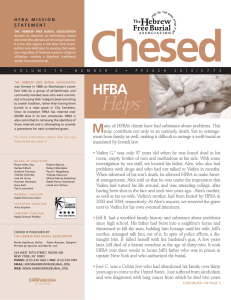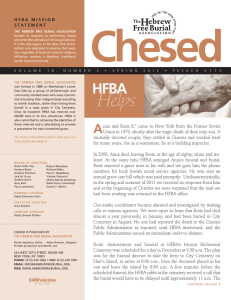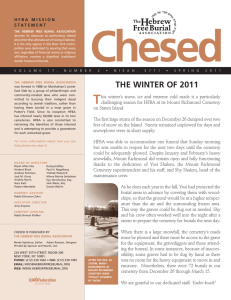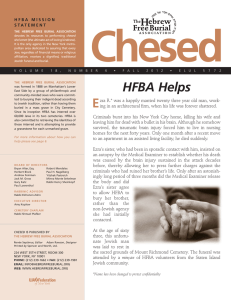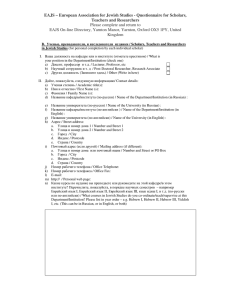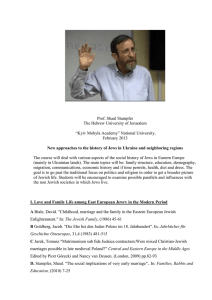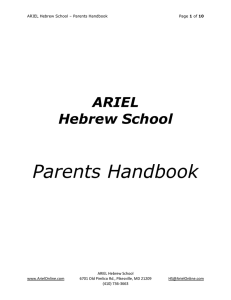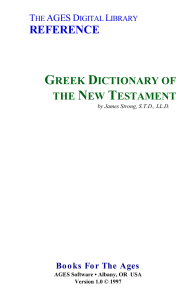HFBA in the News - Hebrew Free Burial Association
реклама
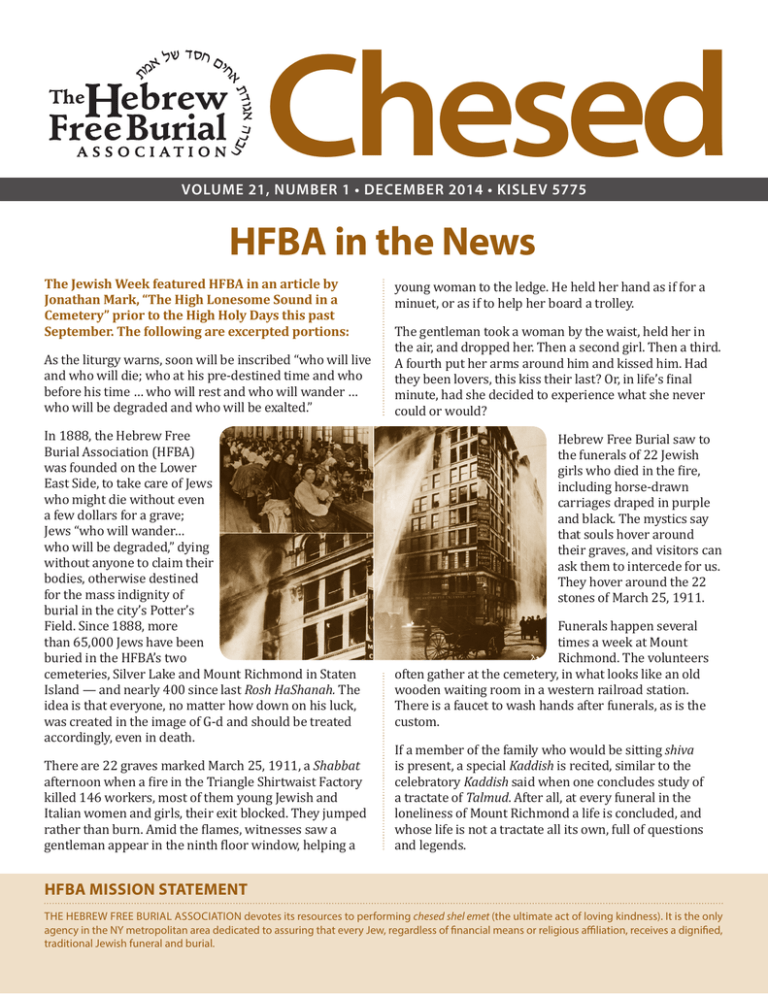
Chesed VOLUME 21, NUMBER 1 • DECEMBER 2014 • KISLEV 5775 HFBA in the News The Jewish Week featured HFBA in an article by Jonathan Mark, “The High Lonesome Sound in a Cemetery” prior to the High Holy Days this past September. The following are excerpted portions: As the liturgy warns, soon will be inscribed “who will live and who will die; who at his pre-destined time and who before his time … who will rest and who will wander … who will be degraded and who will be exalted.” In 1888, the Hebrew Free Burial Association (HFBA) was founded on the Lower East Side, to take care of Jews who might die without even a few dollars for a grave; Jews “who will wander… who will be degraded,” dying without anyone to claim their bodies, otherwise destined for the mass indignity of burial in the city’s Potter’s Field. Since 1888, more than 65,000 Jews have been buried in the HFBA’s two cemeteries, Silver Lake and Mount Richmond in Staten Island — and nearly 400 since last Rosh HaShanah. The idea is that everyone, no matter how down on his luck, was created in the image of G-d and should be treated accordingly, even in death. There are 22 graves marked March 25, 1911, a Shabbat afternoon when a fire in the Triangle Shirtwaist Factory killed 146 workers, most of them young Jewish and Italian women and girls, their exit blocked. They jumped rather than burn. Amid the flames, witnesses saw a gentleman appear in the ninth floor window, helping a HFBA MISSION STATEMENT young woman to the ledge. He held her hand as if for a minuet, or as if to help her board a trolley. The gentleman took a woman by the waist, held her in the air, and dropped her. Then a second girl. Then a third. A fourth put her arms around him and kissed him. Had they been lovers, this kiss their last? Or, in life’s final minute, had she decided to experience what she never could or would? Hebrew Free Burial saw to the funerals of 22 Jewish girls who died in the fire, including horse-drawn carriages draped in purple and black. The mystics say that souls hover around their graves, and visitors can ask them to intercede for us. They hover around the 22 stones of March 25, 1911. Funerals happen several times a week at Mount Richmond. The volunteers often gather at the cemetery, in what looks like an old wooden waiting room in a western railroad station. There is a faucet to wash hands after funerals, as is the custom. If a member of the family who would be sitting shiva is present, a special Kaddish is recited, similar to the celebratory Kaddish said when one concludes study of a tractate of Talmud. After all, at every funeral in the loneliness of Mount Richmond a life is concluded, and whose life is not a tractate all its own, full of questions and legends. THE HEBREW FREE BURIAL ASSOCIATION devotes its resources to performing chesed shel emet (the ultimate act of loving kindness). It is the only agency in the NY metropolitan area dedicated to assuring that every Jew, regardless of financial means or religious affiliation, receives a dignified, traditional Jewish funeral and burial. HFBA Helps A case manager at a Brooklyn medical center referred Sergei’s wife Irina to HFBA after her husband died and she was left alone and destitute. All SSI monies had gone to pay for Sergei’s stay in a nursing home in which he had lived for several years prior to his death. Only $30 was in their bank account and their only child lived with his wife and child in the far eastern part of Russia, completely unable to be of any help. HFBA applied for burial assistance from the Human Resources Administration and HFBA absorbed the large balance. Rabbi Plafker kindly picked up Irina to go to Sergei’s funeral at Mount Richmond Cemetery. Standing at Sergei’s grave, Irina was able to see the grave of her father buried nearby. Julia, age 72, had suffered from AIDS and cancer and was living in subsidized housing on Manhattan’s Lower East Side when she died. A close friend knew that Julia had an estranged brother and knew that the housing facility had a copy of her birth certificate. Members of the dedicated HFBA staff were able to trace the cemetery in which Julia’s parents were buried and the staff of that cemetery was able to provide information about next of kin. HFBA was able to reach Julia’s brother, Al, who explained that Julia had severe mental health issues which caused the estrangement between the siblings. Despite his own precarious financial situation and advanced age, Al arranged for Julia to be buried next to their parents. In the last edition of Chesed, we recounted the story of Adele Melman, a Holocaust survivor, whose daughter, Hannah, was mentally ill, homebound with only two cats for company and refusing to communicate with any agency having to do with her mother. Several months after her mother’s death, Hannah was found dead in her apartment. A social worker at the apartment complex told HFBA that there appeared to be no next of kin who could give permission for the body’s release and burial. Although the Public Administrator quickly provided a release, there was a delay because the Medical Examiner had a difficult time identifying her and the cause of death due to the body’s decomposition by the time it was found. Khana and Iosif came to the United States from the Former Soviet Union. They spoke little English and lived a frugal life on their SSI and Medicaid benefits. Several years ago, their adult son died suddenly and HFBA handled the burial. When Iosif died, a volunteer from the local Bikur Cholim drove Khana to HFBA’s Mount Richmond Cemetery for his funeral. Names changed to protect confidentiality. Did You Know? Cybercrooks have been e-mailing fake funeral announcements. If you open the link, your passwords, files and personal information can be stolen. The subject line usually reads “Passing of your friend” or “Funeral notice.” Be careful—and don’t be fooled. Delete without opening. A Q & Q: When does blood require burial? A: Blood which leaves the body at the time of death, or subsequent to the death, requires burial. 2 | The Hebrew Free Burial Association | Chesed HFBA has a Speakers Bureau which can provide speakers for your synagogue, school or other organization. Please call Executive Director Amy Koplow to arrange for an interesting and informative presentation about Jewish burial practices and HFBA’s important and historic work. A Few Days with HFBA The HFBA administrative staff is busy 365 days a year making certain that, as Jewish law prescribes, burials occur as soon as possible after death and the HFBA chaplain and cemetery staff attend all burials. A recent weekend included the following: FRIDAY: Two burials take place at Mount Richmond Cemetery. HFBA staff arranges for three burials on Sunday, three on Monday, one on Tuesday. SATURDAY NIGHT: The HFBA funeral staff finalizes arrangements for Sunday and Monday burials. SHABBAT:In conjuction with Parshat Chayei Sara, Amy Koplow, HFBA Executive Director, and Board member Hank Sheinkopf, speak about Jewish poverty in New York City and about HFBA’s work at The Jewish Center in Manhattan. Gary Katz, also a Board member, speaks at Temple Israel Center in White Plains. SUNDAY: HFBA’s annual Parshat Chayei Sara Community Chesed Day attracts 50 volunteers on a cold morning to clear debris at Silver Lake Cemetery. Three burials at Mount Richmond Cemetery are attended by the volunteer minyan. These burials bring the census to 330 cases for 2014. Save the Date! Staten Island Parshat Vayechi Community Breakfast Sunday, December 28, 2014 9:30 am Young Israel of Staten Island Bentzion Schorr Photography Young Leadership In an effort to engage and educate college students and young professionals about HFBA’s history and mission, our new Young Leadership Committee held its kickoff event this past September. Recognizing Rabbi Shmuel Plafker for 25 years of dedicated service to Hebrew Free Burial Association Noah Morris of the HFBA staff and his Young Leadership committee of volunteers coordinated the event which attracted 65 people who enjoyed sushi and cocktails in a private courtyard in Washington Heights. Guest Speaker Rabbi Mordechai Becher Join us to combine your commitment to chesed shel emet with socializing with others who share your values. To make a reservation, or to find out how to arrange for a fundraising event in your community, please call HFBA Executive Director Amy Koplow. Check out HFBA’s Facebook page for the next Young Leadership event: www. facebook.com/ hebrewfreeburial. 3 HFBA Thanks Our Volunteers We thank all our volunteers who helped at Silver Lake Cemetery on November 16, Parshat Chayei Sara Community Chesed Day, as well as the other individuals and groups who have helped in the previous months including: • ASHAR • Congregation Beth Hatikvah • The Frisch School • JEC • North Shore Hebrew Academy High School • Rambam Mesivta • Rosenbaum Yeshiva of North Jersey • SAR • Solomon Schechter School of Westchester • Torah Academy of Bergen County • Yeshiva of Flatbush • “Helping Hands” (Greater Jersey Hudson River Region BBYO, NFTY GER | Garden Empire Region, Hagalil USY, JTeenMW, JCC of Staten Island, Jewish Federation of Greater Middlesex County, Temple B’nai Abraham Livingston, NJ, Bergen County High School of Jewish Studies (BCHSJS), Temple Emanu-El of West Essex: Building Kehila One Relationship at a Time) HFBA Vice President Robbie Marcus and his daughter Abby, a member of HFBA’s Young Leadership committee, at the Parshat Chayei Sara Community Chesed Day Helping Hands volunteers at Silver Lake Cemetery ASHAR Young Leadership volunteers at the Parshat Chayei Sara Community Chesed Day Congregation Beth Hatikvah at the Parshat Chayei Sara Community Chesed Day The Hebrew Free Burial Association | Chesed | 4 BELOW ARE TRANSLATED SUMMARIES OF THE ARTICLES APPEARING IN THIS ISSUE OF CHESED. HFBA в прессе В сентябре перед праздниками еженедельник <The Jewish Week> посвятил HFBA статью Джонатана Марка, озаглавленную <Высокий звук на кладбище>. Ниже мы приводим выдержки из этой статьи: <...согласно литургии, скоро в Книге Жизни будет записано, кому жить и кому умирать, кому в своё время, а кому - до времени, кто будет отдыхать, а кто - странствовать, кто будет унижен, а кто - возвышен.> В 1888 году было основано Еврейское Благотворительное Похоронное Бюро (HFBA) в нижней части восточного Манхэттена, чтобы позаботиться о евреях, у которых не было даже нескольких долларов на оплату похорон, о тех, кто странствовал, кто был унижен и кому грозило унижение и после смерти, т. е. погребение в городской безымянной могиле для бедняков Поттерс Филд. С 1888 года HFBA похоронило 65 тысяч евреев на двух кладбищах - Сильвер Лейк и Маунт Ричмонд на Стейтен Айленд. Только за последний год было организовано четыреста похорон. Деятельность HFBA основана на понимании того, что каждый, вне зависимости от достатка, сотворён по образу Вс-вышнего и заслуживает достойного обращения даже после смерти. Среди могил есть двадцать две с одной и той же датой смерти - 25 марта 1911 года - субботнего дня, когда страшный пожар на фабрике одежды в здании ньюйоркского <Утюга> унёс жизни 146-и работавших там девушек, в основном из семей еврейских и итальянских иммигрантов. Двери были заперты, и многие предпочли выпрыгнуть из окон девятого этажа, чем погибнуть в пламени. Очевидцы говорили, что какой-то мужчина пытался помочь одной из девушек выбраться на карниз девятого этажа, держа её руку будто в танце... HFBA организовало похороны еврейских девушек, погибших в пожаре, включая запряженные лошадьми катафалки с лилово-чёрной драпировкой. Верящие в мистику говорят, что души усопших витают рядом с могилой, и посетители кладбища могут просить их о заступничестве. Они витают у могил, отмеченных единой датой 25 марта 1911 года...> HFBA помогает После смерти Сергея* в доме для престарелых в Бруклине ведущий дела пациентов направил жену Сергея Ирину в HFBA. Пособие по бедности на их семью в течение нескольких лет уходило на оплату лечения Сергея, так что на счету оставалось 30 долларов. Их единственный сын жил со своей семьёй на Дальнем Востоке в России и не мог ничем помочь. HFBA подало на частичную оплату 5 | The Hebrew Free Burial Association | Chesed похорон департаментом вэлфера Нью-Йорка, и в итоге оплатило большую часть расходов. Равин HFBA г-н Плафкер отвёз Ирину на кладбище Маунт Ричмонд, где она смогла присутствовать на похоронах Сергея и посетить могилу своего отца, похороненного неподалёку. Хана и Иосиф* приехали в США из одной из республик бывшего Советского Союза. Они плохо говорили по-английски и жили очень скромно на пособие по социальному страхованию и Медикейд. Несколько лет назад их взрослый сын скончался, и HFBA организовало его похороны. После смерти Иосифа волонтёр из организации Бикур Холим (<Посещение больных>) вызвался отвезти Хану на похороны Иосифа на кладбище Маунт Ричмонд. *имена изменены Несколько дней в календаре HFBA Наши сотрудники заняты 365 дней в году, поскольку еврейская традиция предписывает, чтобы похороны усопшего состоялись как можно скорее. Поэтому и раввин нашего Бюро, и работники кладбища всегда наготове и посещают все церемонии. Вот расписание одного из недавних уикэндов: Пятница: два погребения на кладбище Маунт Ричмонд, затем сотрудники подготовили ещё три погребения на воскресенье, три на понедельник и одно - на вторник. Шаббат: Эми Коплоу, исполнительный директор HFBA, и Хэнк Шейнкопф, член совета директоров, выступили в Еврейском центре в Манхэттене, рассказав о еврейской бедности в Нью-Йорке и о работе HFBA. Гарри Кац, член совета директоров, выступил в еврейском центре Темпл Исраэль в городе Уайт Плейнс. Вечер субботы: сотрудники Бюро завершают приготовления для погребений в воскресенье и понедельник. Воскресенье: ежегодный день милосердия, проводимый HFBA в то время, когда в сигагогах читают недельную главу Торы <Хаей Сара>, привлёк пятьдесят волонтёров для расчистки мусора на кладбище Сильвер Лейк. В этот же день с участием миньяна из добровольцев проведены три погребения на кладбище Маунт Ричмонд. С ними число погребений за 2014 год достигло 330. Вопросы и ответы Вопрос: Когда нужно погребать кровь? Ответ: Кровь, покидающая тело во время или после смерти, требует погребения. Please consider... ...making a recurring donation which will automatically process each month on the date of your choice. Call the HFBA office at (212) 239-1662 for more information and to initiate this type of contribution. Thank you! Chesed Shel Emet – HOW YOU CAN HELP REMEMBER to include HFBA in your will with a bequest. DONATE unused graves. If the graves are not part of a burial society or family plot and are located in New York or New Jersey, please consider donating them to HFBA and receiving a tax deduction for your gift. ESTABLISH an HFBA Forever Gift Annuity or Charitable Trust Plan. In addition to the guaranteed income and tax benefits, these plans ensure that HFBA’s promise of a Jewish burial to future generations of indigent Jews will be fulfilled. SPONSOR perpetual grave care for an indigent’s grave for $600. ENROLL a Bar/Bat Mitzvah in our “Mitzvah Circle” by suggesting a gift to HFBA to your guests. The generous child who shares his/her simcha in this way receives a framed certificate. CELEBRATE a simcha or commemorate a loss with HFBA cards. Cards cost $18 and can include a personalized message. CONTRIBUTE to HFBA to ensure an annual Yahrzeit reminder for your lost loved ones. VOLUNTEER with your friends, classmates, fellow group members, or family at our cemeteries as part of our Cemetery Clean-Up Project. INSTITUTE a perpetual Yahrzeit Kaddish for your loved one for a donation of $180. GET INVOLVED as a professional with HFBA by donating your expertise and skills in an area that can help us. ARRANGE for kaddish to be said for the eleven month mourning period following a death of a relative or friend for a donation of $360. PLEASE HELP OUT TODAY BY SENDING A DONATION IN THE ENCLOSED ENVELOPE. THE HEBREW FREE BURIAL ASSOCIATION was formed in 1888 on Manhattan’s Lower East Side by a group of philanthropic and community-minded Jews who were committed to burying their indigent dead according to Jewish tradition, rather than having them buried in a mass grave in City Cemetery. Since its inception HFBA has interred over 65,000 Jews in its two cemeteries. HFBA is also committed to retrieving the identities of those interred and is attempting to provide a gravestone for each unmarked grave. BOARD OF DIRECTORS Herbert Block Andrew Feinman Richard Fishman Charles Greinsky Gary Katz Anna Kleyman Paul Lowenthal Robert Marcus Robert Mendeles Paul H. Nagelberg Yitzhak Pastreich Minna Monte Seitelman Rabbi Henry Sheinkopf Norman Weisman RABBINIC ADVISOR CEMETERY CHAPLAIN Rabbi Elchonon Zohn Rabbi Shmuel Plafker EXECUTIVE DIRECTOR Amy Koplow 6 CHESED IS PUBLISHED BY THE HEBREW FREE BURIAL ASSOCIATION Renée Septimus, Editor Adam Rawson, Designer Printed by Spencer and Worth, Ltd. 224 WEST 35TH STREET, ROOM 300 NEW YORK, NY 10001 PHONE: (212) 239-1662 • FAX: (212) 239-1981 EMAIL: INFO@HEBREWFREEBURIAL.ORG WEB: WWW.HEBREWFREEBURIAL.ORG
